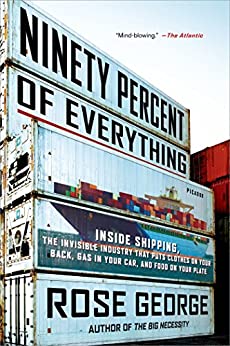Always Cheaper By Sea
90% Of Everything moves by ship, at least according to author Rose George in her 2013 book that’s still fascinating reading today. George traveled as a passenger on a cargo ship called the Maersk Kendal. While onboard she interviewed the captain and crew members, enabling her to present an absorbing picture of maritime freight, an industry that enables free trade that few of us consider.
It costs one cent to ship a can of beer 3,000 miles, approximately the narrowest distance across the north Atlantic Ocean. That statistic reminds how waterborne trade has always been the cheapest way of moving goods. Moving a sweater costs 2.5 cents.
The Congressional Research Service estimates that moving crude oil by rail costs $10-15 per barrel. Just over four years ago the Energy Information Administration (EIA) estimated $3.50 per barrel to move crude by pipeline from Cushing, OK to the Texas gulf coast, around 560 miles.
A Very Large Crude Carrier (VLCC) that can hold 2 million barrels and costs $50K per day works out to 25 cents per barrel for a ten-day trans-Atlantic journey.
Shipping is incredibly cheap.
George finds that Scottish cod can profitably make a round trip to China and back for filleting, saving money versus employing Scottish filleters.
Ubiquitous steel shipping containers revolutionized the economics. It wasn’t uncommon for transport costs to eat up 25% of the value of the goods being used until TEUs (“twenty foot equivalents units”) created uniformity and reduced theft from longshoremen.
Statista estimates there are 5,589 merchant ships plying the world’s oceans, up from 5,079 in 2013 when Rose published her book. There’s no agreement on how many shipping containers exist – a Google search ranges from 17 million to 170 million.
The number of US-flagged merchant ships was declining until 2016 and remains very low. China has at least 30X as many. George estimates that Filipinos represent more than a third of all crews globally, with 250,000 of them at sea. If you’ve ever been on a cruise, you’ll know Americans are exclusively passengers, never crew. The US taxes its citizens regardless of domicile, contrasting with many other countries. The economics don’t work.
We follow the Maersk Kendal as she traverses the Suez Canal, blocked two years ago when the Ever Given ran aground. Rose George recounts a story from the Kendal’s captain when an error by the Egyptian pilot briefly left his ship stuck on a sandbar. The captain was able to maneuver off and found the pilot outside on deck praying.
The Maersk Kendal then sails off the coast of Somalia, causing George to turn to piracy which was more common in the Gulf of Aden than it is today. She recounts several tales of kidnappings, and the dramatic rescue of a kidnapped merchant captain by US Navy SEAL snipers who shot three pirates in darkness from a nearby boat while both were bobbing around.
Somali pirates are less active today, thanks to more active patrols in the region.
The US Navy plays an unparalleled role in protecting sea lanes for commercial traffic. Global trade rose as a % of GDP for several decades because of US military power as well as the falling cost of shipping. That trend has stalled in recent years.
The pandemic and Russia’s invasion of Ukraine have both caused a rethinking of supply chains. If the US at some point concludes that policing the world’s shipping is a lower priority, there’s no obvious replacement. The Council on Foreign Relations offers some background on this. If cargo ships faced longer routes with increased risk, this would further impede global trade.
The appeal of 90% Of Everything is the visibility it provides on an industry we rarely see and usually take for granted. Rose George describes the choreographed movements of global trade’s enablers and the cramped living conditions, work and tedium of crews who spend months or years away from home. She reminds that at sea, “…the captain is our god; he can marry you, baptize you, and even bury you without anybody’s permission.”
Covid lockdowns were especially tough on crews who were often stranded indefinitely on ships in sight of harbor while health officials wrangled with ship owners over pandemic protocols.
Statista calculates that today 80% of finished goods move by sea, and estimates volumes doubled from 1990-2020. 90% Of Everything may be a decade old but retains most of its relevance. You’ll finish it with a newfound appreciation of the maritime freight industry along with numerous obscure facts to be dropped in casual conversation.
We have three funds that seek to profit from this environment:
